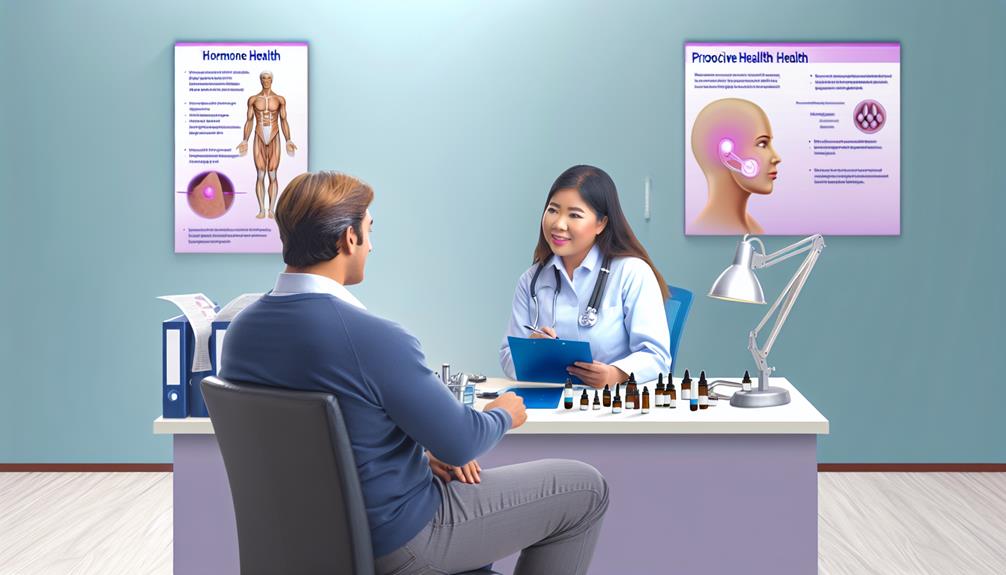To manage my hormone levels during aging, I prioritize balanced nutrition, regular exercise, and quality sleep. I focus on foods rich in vitamin D, omega-3 fatty acids, and zinc while avoiding excess sugar and processed items. Strength training and cardiovascular workouts help maintain muscle mass and promote hormone balance. Additionally, I guarantee good sleep hygiene to optimize hormone production, especially testosterone, while managing stress through mindfulness and physical activity. Regular health screenings are critical for monitoring changes. Making these lifestyle adjustments can greatly enhance my overall well-being—there's plenty more to explore on this topic for deeper insights.
Understanding Hormonal Changes

As we age, understanding hormonal changes becomes essential to maintaining our overall health. One of the most significant shifts I've noticed is the testosterone decline that many men experience. This decrease can lead to decreased muscle mass, fatigue, and even mood disorders. It's imperative to monitor estrogen balance, as elevated levels can negatively impact testosterone and overall well-being.
Thyroid function also plays a fundamental role in regulating metabolism and energy levels. Age-related changes can result in hypothyroidism, which may contribute to weight gain and fatigue. Additionally, I've found that cortisol levels, often influenced by stress, can affect adrenal health. Chronic stress may lead to adrenal fatigue, further complicating hormonal balance.
Another important aspect is insulin sensitivity. As we age, our bodies may become less responsive to insulin, increasing the risk of metabolic disorders. Growth hormone levels typically decline as well, impacting muscle and tissue repair. Recognizing these hormonal fluctuations is essential for developing effective management strategies.
Lifestyle impacts cannot be overlooked either. Diet, exercise, and sleep quality directly influence hormonal health. By adopting a balanced diet rich in nutrients, engaging in regular physical activity, and prioritizing sleep, I can mitigate some of the negative effects of hormonal changes.
Importance of Balanced Hormones
Maintaining balanced hormones is essential for overall health and well-being, especially as we age. As I navigate the complexities of aging, I've come to realize that hormone fluctuations can markedly impact our physical and mental health. When hormones are out of balance, we may experience various aging effects, such as decreased energy, mood swings, and even diminished sexual function.
Understanding the importance of balanced hormones can help us manage these challenges. It's evident that hormones like testosterone, estrogen, and cortisol play vital roles in our body's functions. When these hormones fluctuate, it can lead to a cascade of issues that affect not just our bodies, but our overall quality of life.
To illustrate the importance of maintaining hormonal balance, I've created a table that highlights the effects of hormone imbalances versus balance:
| Hormonal Status | Effects of Imbalance | Benefits of Balance |
|---|---|---|
| Low Testosterone | Fatigue, depression, reduced libido | Increased energy, improved mood |
| High Cortisol | Weight gain, anxiety, sleep issues | Better stress management, restful sleep |
| Low Estrogen | Hot flashes, mood swings, bone loss | Stable mood, improved bone density |
As I reflect on these factors, it's clear that managing hormone levels is not just a personal concern, but a significant aspect of aging gracefully. Making informed choices can lead to a healthier, more vibrant life.
Nutrition for Hormone Health

When it comes to maintaining hormone health, the role of nutrition can't be overstated. I've found that certain essential nutrients are vital for hormonal balance, while other foods can disrupt this delicate system. It's important to focus on nutrient-dense options and be mindful of what to avoid for ideal hormone function.
Essential Nutrients for Balance
Achieving hormonal balance requires a keen understanding of the essential nutrients that play a pivotal role in regulating hormone levels. One of the most important nutrients is vitamin D, which influences testosterone production and overall hormonal health. Omega 3s are significant too, as they help reduce inflammation and support cellular function, which is essential for hormone synthesis.
My zinc levels must be adequately maintained, as zinc is integral for testosterone production and overall reproductive health. Similarly, magnesium intake is important; it aids in the regulation of various hormonal pathways. Dietary fiber shouldn't be overlooked either, as it supports gut health, which is linked to hormonal balance.
Incorporating antioxidant foods into my diet can help combat oxidative stress, which can disrupt hormone levels. I also need to pay attention to my protein sources; adequate protein is necessary for hormone production and muscle maintenance. Healthy fats, particularly from sources like avocados and nuts, are essential for hormone synthesis as well. Finally, B vitamins and trace minerals play critical roles in energy metabolism and hormonal regulation, making them indispensable for maintaining balanced hormone levels as I age.
Foods to Avoid
Understanding which foods to avoid is just as important as knowing what to include in my diet for ideal hormone health. First, I need to be cautious with my sugar intake. Excess sugar can lead to insulin resistance, disrupting hormone levels. Processed foods are another concern; they often contain trans fats and preservatives that can negatively impact my endocrine system.
I should also limit alcohol consumption. It can alter testosterone levels and liver function, which are essential for hormone balance. Caffeine effects shouldn't be overlooked either; while moderate consumption may be fine, excessive caffeine can lead to increased cortisol levels, contributing to hormonal imbalances.
Additionally, I need to be wary of soy products, as they contain phytoestrogens that might interfere with my hormonal health. Artificial sweeteners can also disrupt gut health, potentially impacting hormone levels. High carb diets can lead to weight gain, further complicating hormone regulation.
Exercise and Physical Activity
As we age, maintaining regular exercise and physical activity becomes essential for managing hormone levels effectively. I've found that incorporating a balanced routine of strength training, cardiovascular workouts, and flexibility exercises greatly impacts my well-being.
Strength training, particularly resistance training, is important for maintaining muscle mass and combating hormonal decline. I aim for at least two sessions per week, focusing on major muscle groups. This not only boosts testosterone levels but also enhances metabolism.
Cardiovascular workouts play a significant role too. Engaging in activities like running, cycling, or swimming helps improve heart health and increases blood circulation, which is critical for hormone distribution. I often incorporate high-intensity interval training (HIIT) a few times a week, as it's efficient and effective for burning fat and elevating growth hormone levels.
Flexibility exercises are another essential aspect of my routine. I dedicate time to mobility routines and stretching, which help maintain joint health and reduce injury risk. This is especially important as we age, since our bodies become more susceptible to stiffness.
Outdoor activities and group sports also add a social dimension that keeps me motivated. Whether it's playing basketball or hiking with friends, these activities not only enhance physical fitness but also promote mental well-being.
Incorporating a variety of these approaches not only helps manage hormone levels but also enhances overall quality of life. By staying active, I feel more energetic and resilient as I navigate the aging process.
Sleep Quality and Hormones

While many factors influence hormone levels, sleep quality plays an essential role that shouldn't be overlooked. I've learned that proper sleep can greatly affect testosterone levels, cortisol production, and overall hormonal balance. When I prioritize sleep, I notice improvements not only in my mood but also in my energy levels and cognitive function.
To optimize my sleep quality, I focus on several sleep hygiene tips. First, I establish a consistent bedtime, which helps regulate my circadian rhythm. By going to bed and waking up at the same time each day, I signal my body when it's time to rest and rejuvenate. This consistency can enhance the quality of my sleep, resulting in more restorative cycles.
I also create a sleep-friendly environment. I make sure my bedroom is dark, cool, and quiet, which helps facilitate deeper sleep. Limiting exposure to screens before bed is essential too, as blue light can disrupt melatonin production, affecting my ability to fall asleep.
Additionally, I avoid stimulants like caffeine and heavy meals close to bedtime. Instead, I might incorporate calming activities, such as reading or gentle stretching, to prepare my mind and body for sleep.
Stress Management Techniques
Sleep quality greatly impacts stress levels, which in turn affects hormone balance. As I've explored the importance of managing stress, I've discovered several effective techniques that can help maintain a healthy hormonal equilibrium. One of the most beneficial methods is incorporating mindfulness practices into my daily routine. Mindfulness allows me to focus on the present moment, reducing anxiety and promoting a sense of calm. Simple exercises, such as mindful meditation, can greatly mitigate stress.
Another technique I've found particularly helpful is deep breathing. By dedicating just a few minutes each day to deep breathing exercises, I can activate my body's relaxation response. Inhale deeply through the nose, filling my lungs completely, and then exhale slowly through the mouth. This not only helps lower cortisol levels but also enhances oxygen flow throughout my body.
Additionally, physical activity serves as a powerful stress reliever. Engaging in regular exercise, whether it's a brisk walk or a more intense workout, releases endorphins that elevate mood and reduce stress. I've noticed that maintaining a consistent exercise schedule also improves my sleep quality, creating a positive feedback loop.
Ultimately, managing stress through these techniques can play an essential role in stabilizing hormone levels as I age. By prioritizing mindfulness practices and deep breathing, I'm taking proactive steps toward better overall health and hormonal balance.
Natural Supplements and Remedies

When considering natural supplements and remedies for managing hormone levels, I've found that herbal supplements can offer significant benefits. Additionally, dietary changes can greatly impact hormonal balance and overall health. It's essential to explore these options carefully to determine what works best for your individual needs.
Herbal Supplements Benefits
As we age, exploring the benefits of herbal supplements becomes increasingly important for managing hormone levels and overall well-being. I've found that incorporating herbal teas and adaptogenic herbs can greatly support hormonal balance. These natural boosters provide a holistic approach to wellness, often acting as traditional remedies that have stood the test of time.
Here's a brief overview of some key herbal supplements and their potential benefits:
| Herbal Supplement | Benefits | Form of Use |
|---|---|---|
| Ashwagandha | Stress reduction, hormone balance | Herbal extracts |
| Maca Root | Energy boost, libido enhancement | Plant-based supplements |
| Ginseng | Improved endurance, energy | Herbal blends |
| Fenugreek | Supports testosterone levels | Herbal teas |
| Rhodiola Rosea | Adaptation to stress | Herbal extracts |
These phytotherapy benefits highlight how integrating these supplements into my routine can lead to better hormonal health. By selecting the right herbal blends, I can effectively address my body's changing needs, ensuring that I maintain balance and energy through the aging process.
Dietary Changes Impact
Understanding how dietary changes impact hormone levels is fundamental for anyone looking to maintain hormonal balance during aging. I've found that adopting a plant-based diet can greatly enhance my overall well-being. Incorporating healthy fats, like avocados and nuts, helps support hormone production. I also focus on sugar reduction, as excess sugar can disrupt hormonal balance.
Portion control plays an important role; eating smaller, balanced meals throughout the day helps regulate blood sugar and energy levels. I've learned the importance of hydration, ensuring I drink enough water to support metabolic processes. Meal timing is another factor I consider; aligning my eating patterns with my body's natural rhythms can improve hormonal function.
Increasing my fiber intake through fruits, vegetables, and whole grains has been beneficial, as fiber aids digestion and helps maintain stable hormone levels. I prioritize diverse protein sources, such as legumes and quinoa, to support muscle health. Finally, incorporating antioxidant-rich foods, like berries and dark leafy greens, provides essential micronutrient diversity, which is critical for hormone regulation. By making these dietary changes, I've noticed a positive impact on my hormone levels and overall health.
Medical Treatments Available
Managing hormone levels during aging often involves exploring various medical treatments designed to address hormonal imbalances. One prominent approach is testosterone replacement therapy (TRT), which aims to restore testosterone levels to a more youthful range. As men age, testosterone levels naturally decline, leading to symptoms such as fatigue, mood changes, and decreased libido. In my experience, working closely with a healthcare provider to assess testosterone levels through blood tests is vital before considering TRT.
There are several forms of testosterone replacement, including injections, transdermal patches, and gels. Each method has its pros and cons, and the choice often depends on individual preferences and medical history. In addition to TRT, another option is hormone therapy that encompasses a range of treatments aimed at balancing not just testosterone, but other hormones as well.
Hormone therapy can involve the use of medications to regulate hormones like cortisol or estrogen, which may also play a role in men's health as they age. It's essential to monitor hormone levels regularly during treatment to avoid potential side effects, including mood swings, weight gain, or sleep disturbances.
I've found that discussing these options with a knowledgeable healthcare professional can provide clarity and help tailor a treatment plan that suits specific needs. Ultimately, understanding the medical treatments available can empower you to take control of your hormonal health and improve your overall quality of life as you age.
Regular Health Screenings

As we age, regular health screenings become essential for monitoring hormone levels and overall well-being. I recommend focusing on key hormones such as estrogen, testosterone, and thyroid hormones during these checkups. Understanding the appropriate timing for these screenings can help us manage our health more effectively.
Importance of Routine Checkups
Routine checkups play an important role in maintaining ideal hormone levels as we age. I can't emphasize enough how vital regular health assessments are for monitoring our overall well-being. Through these evaluations, we can identify hormonal imbalances that may arise due to the natural aging process.
During a routine checkup, healthcare providers often recommend hormone testing, which can pinpoint specific deficiencies or excesses. For instance, checking testosterone levels can reveal whether they're within a healthy range or if further action is needed. These tests provide invaluable data that help tailor personalized treatment plans, ensuring we address any hormonal issues before they escalate.
Moreover, routine assessments allow for early detection of related health conditions, such as metabolic syndrome or osteoporosis, which can be influenced by hormone levels. By staying proactive with my health, I'm fundamentally setting the stage for a healthier aging process.
Key Hormones to Monitor
Monitoring key hormones is essential for understanding how aging affects my body. As I age, keeping an eye on testosterone levels becomes imperative, as declining levels can impact muscle mass and libido. I also need to take into account estrogen balance, as both men and women require a proper ratio for ideal health. Thyroid function is another essential hormone to monitor; a sluggish thyroid can affect metabolism and energy levels.
Cortisol regulation is important too, as chronic stress can disrupt adrenal health and lead to fatigue. I should also be aware of growth hormone, which plays a role in muscle recovery and overall vitality. DHEA levels are significant as well; they often decline with age and can influence mood and energy. Monitoring insulin sensitivity is crucial to prevent metabolic issues, and I shouldn't overlook progesterone management, particularly if I'm experiencing symptoms related to hormonal imbalances.
Timing of Screenings
It's essential to establish a schedule for regular health screenings as I age, guaranteeing I stay on top of my hormone levels. Understanding the appropriate screening frequency is vital for detecting hormonal imbalances early. Typically, I should begin with basic screenings in my late 20s or early 30s, focusing on testosterone and thyroid levels, as these are key indicators of my overall hormonal health.
As I hit various age milestones, the frequency of these screenings may need to adjust. For instance, during my 40s, I should consider annual tests, while in my 50s and beyond, semi-annual or even quarterly assessments might be advisable. This proactive approach allows me to monitor changes in hormone levels and address any concerns promptly.
Additionally, I shouldn't overlook other essential health screenings, like cholesterol and blood pressure checks, which can also affect hormone production and overall well-being. By adhering to a structured schedule, I can optimize my health management efforts and adapt my lifestyle as necessary. Regular consultations with my healthcare provider will guarantee that my screening strategy remains tailored to my evolving needs.
Avoiding Endocrine Disruptors
Avoiding exposure to endocrine disruptors is essential for maintaining hormone balance as we age. These hormone disruptors, often found in everyday products, can interfere with our body's endocrine system, leading to unwanted hormonal fluctuations. As I navigate this aspect of aging, I'm keenly aware of how chemical exposure can affect my health and well-being.
To minimize my risk of encountering these disruptors, I've adopted a few practical strategies:
- Choose Natural Products: I opt for personal care and cleaning products that are free from synthetic chemicals and fragrances. This helps reduce the risk of exposure to harmful endocrine disruptors.
- Read Food Labels: I pay close attention to ingredients in food packaging. I avoid products containing BPA, phthalates, and other chemicals known to disrupt hormonal balance.
- Limit Plastic Use: Whenever possible, I use glass or stainless steel containers instead of plastic. This reduces the likelihood of leaching harmful chemicals into my food and beverages.
- Be Cautious with Pesticides: I make an effort to buy organic produce when I can. This reduces my exposure to chemical pesticides that may act as hormone disruptors.
Building a Support System

Building a support system is essential for effectively managing hormone levels as we age. I've found that surrounding myself with the right people and resources can greatly impact my overall well-being. Peer support plays a key role; connecting with others who share similar experiences helps me feel less isolated in my journey. Online communities offer platforms where I can share concerns and gain insights from men facing similar hormonal changes.
Family involvement is also important. Open communication strategies with family members guarantee they understand my needs and challenges, fostering a supportive environment. They can provide encouragement and assist with lifestyle modifications, which is beneficial for both mental health and hormone management.
Seeking professional guidance from healthcare providers can enhance my approach. They can offer tailored advice and lifestyle coaching that aligns with my specific hormonal needs. An accountability partner, whether a friend or a professional coach, helps keep me on track with my health goals, making it easier to stay committed.
Making Lifestyle Changes
Making effective lifestyle changes is crucial for managing hormone levels as we age. I've come to realize that adopting a holistic approach not only benefits my physical health but also enhances my mental well-being. Here are four key areas I focus on to help maintain balance in my hormone levels:
- Mindful Eating: By prioritizing nutrient-dense foods, I can support my body's hormonal functions. This means being conscious of portion sizes and choosing whole grains, lean proteins, and healthy fats.
- Hydration Habits: Staying well-hydrated is fundamental. I make it a point to drink enough water throughout the day, as dehydration can lead to hormonal imbalances.
- Outdoor Activities: Engaging in regular physical activities outdoors has been transformative. Whether it's hiking or simply walking in the park, exposure to natural light boosts my mood and regulates hormones.
- Digital Detox: I find that stepping away from screens reduces stress levels considerably. This practice encourages more time for self-care, community involvement, and recreational hobbies, fostering social connections that are essential for a positive mindset.
Frequently Asked Questions
How Do Genetics Influence Hormone Levels in Aging Men?
I've often wondered how genetics plays a role in hormonal fluctuations as men age. It turns out that our genetic predisposition greatly influences how our hormone levels change over time. Certain genes can determine the rate at which testosterone decreases, leading to varying experiences among men. Understanding this connection helps us recognize that while lifestyle choices matter, our genetic makeup can also dictate our hormonal balance as we grow older.
Can Hormone Levels Affect Mood and Mental Health?
Imagine a ship tossed by waves, struggling to stay afloat. That's how I feel when hormonal fluctuations hit. They can greatly impact mood and lead to mood disorders, leaving me anxious or irritable. The stress impact of aging effects on our bodies can disrupt emotional stability, making mental wellness feel elusive. It's essential to recognize this connection, as understanding our hormones can help navigate the choppy waters of mental health during life's journey.
What Role Does Alcohol Play in Hormone Balance?
Alcohol plays a significant role in hormone balance. I've learned that alcohol metabolism can disrupt hormone levels, particularly testosterone and estrogen. When I drink, my body prioritizes breaking down alcohol, which can lead to hormonal imbalances. This disruption may affect mood, energy levels, and overall health. It's essential to be mindful of alcohol consumption, as even moderate drinking can have lasting effects on hormone regulation and overall well-being.
Are There Specific Foods That Boost Testosterone Levels?
I often wonder about specific foods that can boost testosterone levels. Incorporating certain dietary changes can serve as effective testosterone boosters. Foods rich in zinc, like oysters and spinach, along with healthy fats from avocados and nuts, can support hormone production. Additionally, I've found that incorporating lean proteins, such as chicken and beans, helps maintain muscle mass, which is essential for testosterone levels. It's fascinating how our diet can directly impact our hormones.
How Can Men Recognize Symptoms of Hormonal Imbalance?
Recognizing symptoms of hormonal imbalance can feel like deciphering a complex puzzle. I've learned that symptom awareness is essential; mood swings, fatigue, and reduced libido often signal an imbalance. It's like my body's way of waving a red flag. When I noticed these signs, I turned to hormonal tests for clarity. They provided a roadmap, showing me where I needed to adjust my lifestyle or seek professional advice to restore balance.
